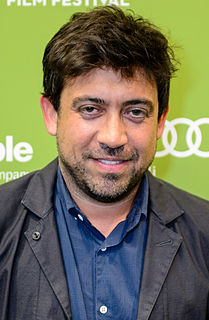A Quote by Peter Hedges
I try, in my films, to normalize things that maybe 20 or 30 years ago a film would have been about. 'Guess Who's Coming to Dinner' needed its own film, but now blended families you see all the time.
Related Quotes
I think now you see a lot more British films from the perspective of, I guess what would be considered "new" British people - people of color, Asian people. I think that's what's happening now, whereas 20 years ago it couldn't happen because it was still predominantly, "British film is about middle-class white families and what they do."
I wanted to create a film that hadn't been created yet. I studied film for many years. The Room is almost 20 years of my work. You see, I understand young people unlike the media. I don't expect people to love The Room 100% but I respect that people enjoy it and that maybe it opens certain doors for them. That's what makes me happy.
Maybe 20 years ago, there would be an event every few months or so, maybe once a year. Now, it just seems like every week there are things happening that remind us that Bible prophecy is being fulfilled and Christ is coming. Having said that, I think that should produce in the Christians, an urgency to share their faith.
I suppose it's nice that I've made films that some people have heard of and respect. That's great. And it's certainly helpful in some regards, but they're really tough economic prospects. They always have been, and that's not necessarily getting any better. And not just the films, but it's also been a rough 10 years for that independent film market. And so I have stumbled onto this point in the timeline where the kind of stuff that I'm trying to do is not... it was a lot easier to know what to do with it 20 years ago.
When I first started making films 30 years ago, people would comment that I was a woman. But strangely, when I was in television, no one ever mentioned that I was a woman. Maybe it was because television and film were different. There were more women working in television than men. There was no split in terms of work - everyone was considered equal
I didn't see films when I was young. I was stupid and naïve. Maybe I wouldn't have made films if I had seen lots of others; maybe it would have stopped me. I started totally free and crazy and innocent. Now I've seen many films, and many beautiful films. And I try to keep a certain level of quality of my films. I don't do commercials, I don't do films pre-prepared by other people, I don't do star system. So I do my own little thing.
I try to express in my films things that no other art can approach. In my monster films for example, I use special effects in the same way one would use a special film stock, a special camera, and so on. Monster films permit me to use all of these elements at the same time. They are the most visual kind of film.
I tend to believe that film can try to save what still can be saved, in terms of our histories, our memories. Because a lot of things are disappearing very quickly, things are changing. We are living in very quick times, and we have a new generation who basically know nothing about events 30 years ago.
You know, in an ideal world, people would just be intrigued and go and see a film without knowing anything about it, because that's where you're going to have the most experience of a film, the biggest, the most revelation of a film. But at the same time, I think there are benefits of having seen a trailer where you actually look forward to seeing moments in a film knowing that they're coming up. I don't know which is better.







































